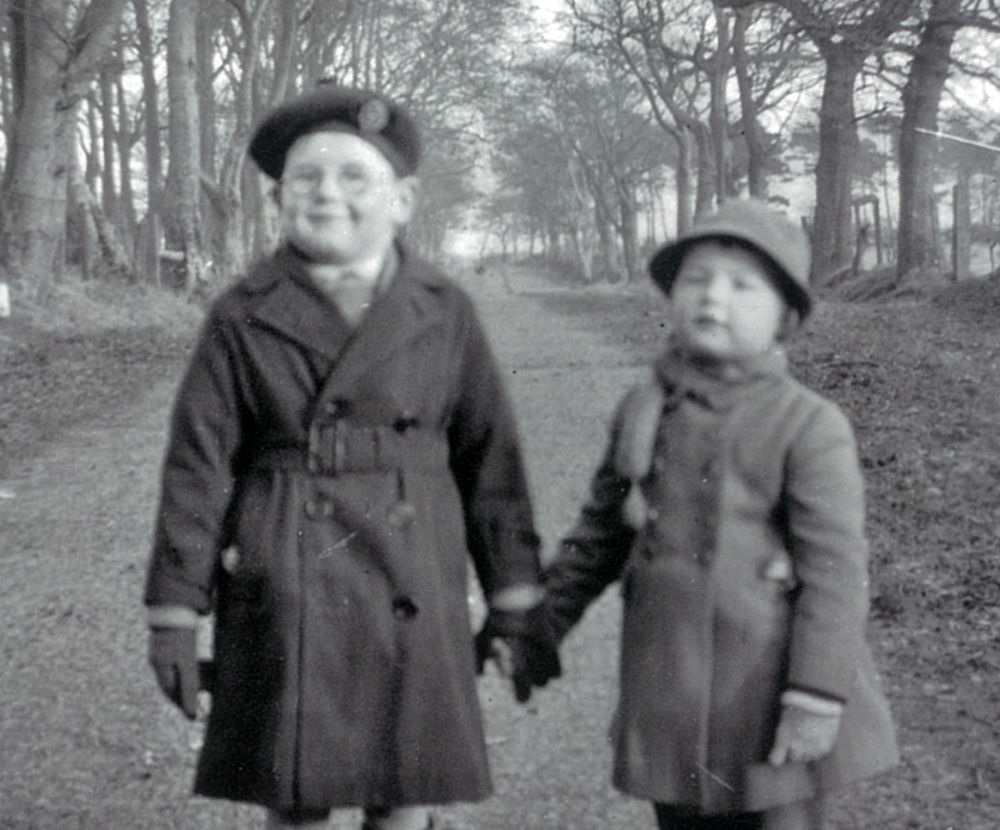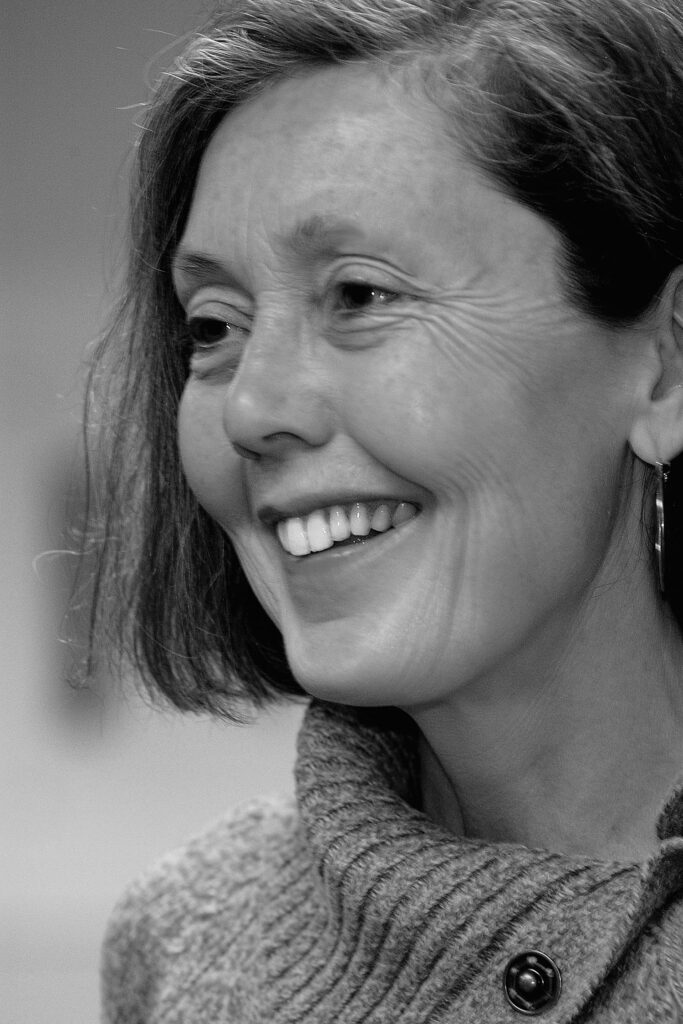Issue 219, Winter 2016
 Gray, left, with his sister, Mora, in Auchterarder, Scotland, ca. 1939.
Gray, left, with his sister, Mora, in Auchterarder, Scotland, ca. 1939.
The Scottish writer Alasdair Gray, now in his eighties, lives in a two-room flat in the bohemian Hillhead neighborhood, near the University of Glasgow, where for many years he used to teach. Described by Will Self as a “little gray deity,” Gray is widely credited with blazing a trail for Scottish-identified fiction in the 1980s—although his books themselves have rarely encouraged imitation. His first major work, Lanark: A Life in Four Books, published in 1981, was thirty years in the writing and came in at nearly six hundred pages, including a false prologue, a false epilogue, footnotes, and a partially fictional “index of plagiarisms.” (The entry under “Burns, Robert” reads, “Robert Burns’ humane and lyrical rationalism has had no impact upon the formation of this book, a fact more sinister than any exposed by mere attribution of sources. See also Emerson.”) Cover illustrations, frontispieces, and design were done by Gray himself, whose drawings often recall the engravings of William Blake. Lanark’s urban realism, playfulness of form, and imaginative splendor emboldened a generation of Scottish writers to look locally for inspiration. The book, Irvine Welsh told Gray’s biographer Rodge Glass, “is probably the closest thing Scotland’s ever produced to Ulysses. What it said to me was, it would be fucking great to be a writer.”
Since then, Gray has published plays and poetry and is nearly as celebrated for his short-story collections—Unlikely Stories, Mostly; Ten Tales Tall and True; and The Ends of Our Tethers—as he is for his major novels: Lanark; 1982, Janine; and Poor Things, which won a Whitbread Book Award and the Guardian Fiction Prize in 1992. He is also a fierce advocate for socialist causes, has written two books in support of Scottish independence, and never misses an opportunity to promote the work of a friend. His 2014 autobiography, Of Me and Others, explicitly set the record straight on fellow artists he feels have been underrecognized.
Gray is a notoriously digressive and polymathic conversationalist. He has a high voice capable of a range of reedy, shrill, or menacing intonations, and he does humorous accents, often slipping into a facetious, hollow, pompous tone when discussing his own achievements. When I visited him, he had recently returned home after a year in the hospital—a bad fall has left him confined to a wheelchair. An assistant was working on a large painting in the book-cluttered front room. The author sat by a window in his bedroom; he has lived alone since the death of his second wife, Morag McAlpine, two years ago. Although the apartment is sparsely furnished, its walls are covered with Gray’s artwork; a grouping of nudes clusters like muses around his mechanized hospital bed. Throughout our interview, Gray gallantly struggled to quell his discursive tendencies, sometimes shuddering and saying, unprompted, “I’m trying to stick to your question!” as if to do so caused physical pain.
—Valerie Stivers
INTERVIEWER
Are you writing anything now?
GRAY
No, but I have recently written a rhymed paraphrase of Dante’s Divine Comedy. I cannot call it a translation as I do not know Italian. My version is based upon eight different English translations, none of which satisfied me. It will be published in three parts, the hell section to be launched for Christmas 2017, purgatory and paradise in following years. The delay is due to my work on the illustrations. The American publisher Gabriel Levinson will publish a book of my recent poems, some of which are translations. But I now have no ideas for more works of fiction and expect none.
INTERVIEWER
You’ve said that many times before. You said it to Kathy Acker and later wrote that “such announcements were truthful but not honest,” admitting that you’re always hoping for new material. Is that still the case?
GRAY
Oh, yes, I’d be delighted if I suddenly got a good new idea, but I think it highly improbable now. I don’t think there’s scope now for me. All my notions for poems and things or new works come generally through reading.
INTERVIEWER
That hasn’t always been the case?
GRAY
No. The earliest verses I wrote were written mainly out of sexual or adolescent frustration and written through the loss of people I loved, either because they got sick of me or had died or gone away. Then I had the intention to write “A single huge novel!” “A single book of all my poetry!” “A single book of all my plays!” [sinister silly voice] “A single book of all my art!”
INTERVIEWER
Why was it important to you that each be just one book?
GRAY
I didn’t think I had a lot of books in me. And I meant my first novel to be an epic which would contain, in an artistic narrative, “everything I knew” and would in fact be a modern Divine Comedy. It took me a long while to write it because I realized at one point that I had to combine two books that I’d started. One was going to be a modern Glaswegian version of A Portrait of the Artist as a Young Man, which would be autobiographical. My artist was a painter of murals who would eventually go mad and commit suicide and maybe even murder because he was insufficiently attractive to women to . . . uh . . . “attract one.” And also it’s hard to be an artist in Scotland if that’s all you’re keen to do.
The other book I wanted to write was a Kafkaesque novel. I felt that Kafka’s Trial and, for that matter, his Castle were taking place in urban communities not totally unlike Prague, where he lived. This world in which an ordinary citizen—well, not all that ordinary, a member of a bank!—finds himself summoned to a court which is held in the attic of a tenement in a slummy quarter of the city—I felt yes, that’s something that could happen. Except, unlike many who read The Trial, I came to the conclusion that in fact K. was guilty, even though he wasn’t quite sure what the crime was, unless it was the crime of being a prosperous member of a bank. Because you’ll find in his dealings with his mistress and other people that he’s utterly selfish and ruthless. Could that be the fault? Could that be where his guilt is located?
In any case, as I say, at first I saw these as two different books, and then I read a book called The English Epic and Its Background by a Cambridge don called Tillyard. In a chapter dealing with a Portuguese epic, Tillyard mentions how the author, writing an account of Vasco da Gama’s voyage to India on behalf of the expanding Portuguese commercial empire, has mixed up with it episodes which involve Neptune, Venus, and nymphs. After da Gama successfully got to India, after a stretch of immense trouble and hardship, there’s a period in which the Portuguese crew are allowed an erotic indulgence with nymphs, et cetera, et cetera. Things straight out of classical Greek mythology! Tillyard was explaining that a true epic could blend all literary forms into one. It was that which decided my Portrait of the Artist as a Young Man and my Kafkaesque afterdeath parody of our society were going to be one book instead of two.
INTERVIEWER
When did you have this realization?
GRAY
I think it was my third year of art school.
INTERVIEWER
In 1954. So still twenty years before you finished Lanark. What was that process like?
GRAY
Well, I was advancing very slowly. The first part of the book would end with Duncan Thaw being accepted to art school, and that was very closely based on my own life. But you see, I believed that as a writer I should have experiences of fatherhood and family life, more adult experience than that of childhood. I was afraid those things might not happen to me. But they did. My first marriage, which lasted for about nine years, was a turbulent but vital one. It provided me with essential experiences that I could not have had if I’d married a decent, wee Scottish girl instead of a rather wildly precocious Danish one. I wasn’t particularly attracted to the decent, wee Scottish girls. And the ones I was attracted to weren’t at all attracted to me, except as a good friend. And I didn’t want a good friend, I wanted a passionate love affair!
INTERVIEWER
What was it about the experiences of your first marriage that helped you write the novel?
GRAY
I hope there is a suggestion that Lanark really loved Rima and was desperately sad and unhappy that she left him, and that he loved his son. It’s meant to be the story of a man who, though he wants very much to love, is very bad at expressing love, but tries.




